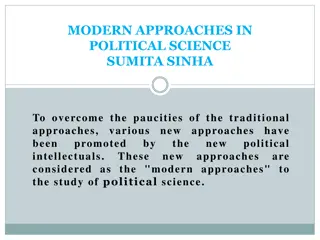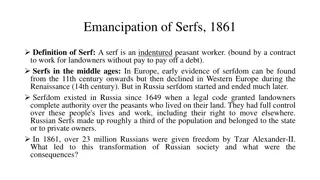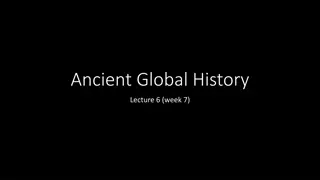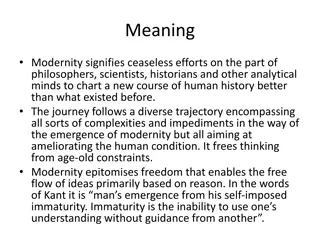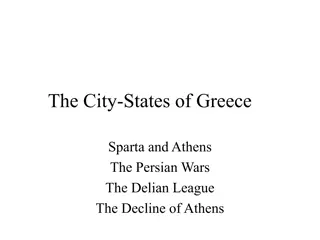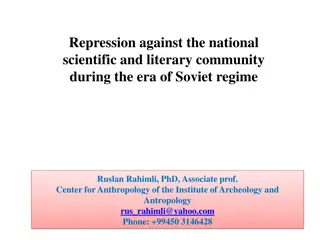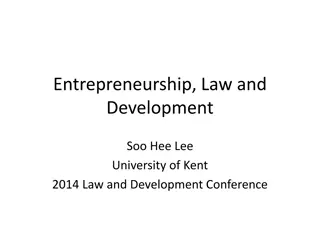Prarthana Samaj
Prarthana Samaj, meaning "Prayer Society" in Sanskrit, was founded in 1867 by Atmaram Pandurang with the objective of promoting belief in one God and advocating worship of the same. The movement gained traction when Mahadev Govind Ranade joined, with intellectuals advocating social system reforms. I
5 views • 12 slides
Modern Approaches in Political Science: Overview and Characteristics
Explore modern approaches in political science pioneered by intellectuals to address the limitations of traditional methods. These approaches emphasize empirical data, interdisciplinary study, and scientific methods to draw conclusions beyond political structures and historical analysis. Key modern
1 views • 13 slides
Emancipation of Serfs in Russia: Causes and Consequences
The Emancipation of Serfs in Russia in 1861 marked a significant transformation in society. Influenced by various factors such as the Crimean War, pressure from nobles and intellectuals, growing peasant uprisings, and economic motives, Tsar Alexander II abolished serfdom. This decision aimed to alle
3 views • 11 slides
The Formation of Intellectuals in Society: Insights from Gramsci
Intellectuals are individuals who utilize their intellect and specialized education to generate ideas and knowledge essential for the functioning of societal production systems. Gramsci delves into how different social groups or classes form their own intellectuals, highlighting processes, historica
0 views • 20 slides
Understanding Gramsci's Political Theory and its Relevance Today
Gramsci's political theory, focusing on concepts such as hegemony, historical bloc, and the role of intellectuals, offers valuable insights into contemporary political challenges. Explored through the lenses of Prof. Ken Spours and Stuart Hall's analytical tradition, this analysis sheds light on Con
0 views • 13 slides
The Impact of Imperialist Intellectuals on Indian History
Imperialist writings of the 19th century, particularly by intellectuals like Max Muller, J.S. Mill, and William Jones, reflected debates on religious faith, nationality, and economic exploitation. These intellectuals, through their biased interpretations and distorted histories, played a significant
0 views • 11 slides
The Axial Age: Pivotal Thinkers Across Ancient Civilizations
The Axial Age, coined by Karl Jaspers, refers to a period from the 8th to 3rd century BCE where pivotal thinkers emerged independently in Persia, India, China, Greece, and Rome, shaping the spiritual foundations of humanity. Jaspers, a German philosopher and psychiatrist, highlighted the importance
2 views • 21 slides
Ultimate Guide to Hosting a Memorable Seder
Discover comprehensive tips on hosting a successful Seder, including shopping lists, online Haggadot options, participant roles, and engaging discussion topics for intellectuals. Prepare for a meaningful Passover celebration with insights on traditions, storytelling, and group interests. Explore way
0 views • 10 slides
Understanding Relational Ontology and Knowledge Production in Sociology
This academic exploration delves into the concept of relational ontology and its methodological implications in knowledge production, focusing on the ownership of ideas and the role of intellectuals as knowledge producers. It discusses the foundational singularity, the generative significance of con
0 views • 12 slides
The Evolution of Modernity: A Discursive Exploration
Modernity symbolizes a continual pursuit by intellectuals to reshape human history for the better, breaking free from old constraints to enhance the human condition. Rooted in the European Enlightenment of the 18th century, it embodies the freedom to reason publicly, leading to new philosophical ide
0 views • 10 slides
Ancient Greece: City-States, Wars, and Culture
Explore the fascinating world of Ancient Greece through the lens of city-states like Sparta and Athens, the epic Persian Wars, the influential Delian League, and the educational systems that shaped brave soldiers and intellectuals. Discover the rise and decline of Athens, the significance of polis i
0 views • 21 slides
Repression Against Azerbaijani Intellectuals During Soviet Regime
The era of Soviet regime in Azerbaijan was marked by severe repression against the national scientific and literary community. From early Bolshevik governance in 1920 to the 1930s, countless individuals, including prominent intellectuals, government members, and ordinary citizens, faced unjust trial
0 views • 30 slides
Understanding Entrepreneurship, Law, and Development in Developing Countries
This text explores how the legal system of a developing country influences entrepreneurial opportunities within the neoliberal context. It discusses the impact of legal rationality, modern law, and intellectual mobilization on the entrepreneurial landscape, with a focus on China. The roles of Max We
0 views • 11 slides
Mapping of My Interests - Senior Pass CEMEA
Image-based reflection on interests related to managerial, administrative, clerical work, practical social skills, realistic and practical aspects, intellectuals and investigative tendencies, artistic inclinations, and social interactions. Each image represents a different dimension of interests and
0 views • 8 slides

